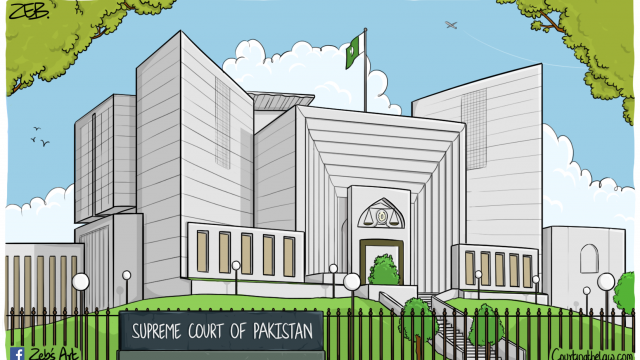Diversity contributes to legitimacy. In a country where the judiciary is under incessant reproval from different echelons of the society for not being as independent as one would like for it to be observed, diversity can play its part as one step forward towards silencing critique and effectuating authority.
A popular debate has recently been making rounds in the corridors of the legal profession and citadels of power regarding the appointment of Justice Ayesha A. Malik as the country’s first female judge to the apex court circumventing the “rule of seniority”. The procedural course that the Judicial Commission of Pakistan has to follow to appoint or elevate a judge can be explored to warrant this elevation. Conversely, the seniority principle, as established by a judgment of the Supreme Court of Pakistan in the Al-Jihad Trust v Federation of Pakistan (1996), can be deliberated to establish the importance of seniority over diversity to authenticate judicial independence and impartiality. Can a balance be struck to ensure both?
The matter has caused a stir. The decision of the Supreme Court in the Al-Jihad Trust case (1996) established that to determine the partiality and independence of the judiciary, it be must be observed that a judge’s appointment and elevation follow a seniority rule rather than the head of state being the ultimate assenting power. The underlying problem settled by this judgment includes getting rid of the institutional and political favouritism during such appointments. This makes sense in Pakistan where such promotions can be guided by political rudders. Lord Hewart, the then Lord Chief Justice of England in the case of Rex v. Sussex Justices (1924) famously said that, “Justice should be seen to be done.” The Pakistan Bar Council also contends that appointments against the seniority principle may mould an impression of impartiality which can shun the public’s trust in the judiciary and be catastrophic for the legal system.
However, the so-called seniority principle has not always been respected.
“Had the seniority principle been followed, we would have had a woman chief justice of the LHC and a judge of the Supreme Court back in 2002-03 when Justice Fakhrunissa Khokar was wrongly and repeatedly bypassed,” said Sindh High Court Bar Association President, Salahuddin Ahmed in October last year upon the enlistment of Justice Ayesha A. Malik, terming it a necessary step towards much needed judicial diversity and female representation in the Pakistani judicial system.
The assertion in favour of diversity on the other hand takes its support from constitutional provisions which mention no word of “seniority” in the elevation of judges (other than for the Chief Justice of Pakistan). Following the Eighteenth Amendment to the Constitution of Pakistan, the executive power of the President in such appointments, and as challenged in the Al-Jihad Trust case, had been set aside and replaced with Article 175 (A) whereby the power had been given to a new commission (the Judicial Commission of Pakistan – JCP) which included senior and former judges, representation of the Pakistan Bar Council and Supreme Court Advocates, Ministry of Law and the Attorney General and subsequently the relevant Parliamentary Committee (although the later inclusion had been nullified in subsequent case-laws). The new law was aimed at a consultation process to ensure smooth and transparent judicial appointments where the eligibility criteria under Article 177 was to be followed (which makes no mention of the term “seniority”). The JCP Rules of 2010 do give power to the Chief Justice of Pakistan to name judges for elevation and this has been done in Justice Ayesha Malik’s nomination as well by the incumbent Chief Justice of Pakistan at the time, Justice Gulzar Ahmed. However, the Pakistan Bar Council and some sections of the legal community have been adamant that the seniority principle be followed.
Both sides of the coin raise concern in their own ways. First, if the seniority principle is not followed, it may mean that the Supreme Court’s decision has been chosen to be ignored in the process. As a body which interprets the law, the Supreme Court’s decision in the Al-Jihad Trust case should be taken as an interpretation of the Constitution’s provisions. If not, then a fresh petition should be filed to seek an overruling of existing authority in the matter. Similarly, if the seniority principle is circumvented, it may again resurrect the argument of political and institutional discretionary involvement in judicial appointments which was put to an end after the 1996 decision. After all, a judicial system that is already dependent on its Chief to assure people that they are acting “independently and under no political influence” does not need to make things more difficult for the judges themselves.
On the other hand, a lack of female representation not only discourages women to join this noble profession but also shatters public faith in the judicial system. This becomes increasingly true every day where sexism, gender discrimination, domestic violence and workplace harassment are on a constant upward trajectory.
Both arguments have their pros and cons. Where one aims at judicial independence and impartiality, the other goes for merit and diversity which is much needed to make the judiciary an institution that is reflective of the society it serves. After all, a judiciary whose composition reflects an apparent lack of fairness will never be able to attract people’s trust in its authority. An unelected institution responsible for the dispensation of justice will not be able to wield authority over its subjects if it draws its composition from a narrow and homogeneous group and marginalizes the rest. The positive thing is that we are finally having this debate. If it can be made constructive instead of deadlocked, it will serve as a step forward in the right direction to achieve judicial independence.
The views expressed in this article are those of the author and do not necessarily represent the views of CourtingTheLaw.com or any other organization with which he might be associated.


